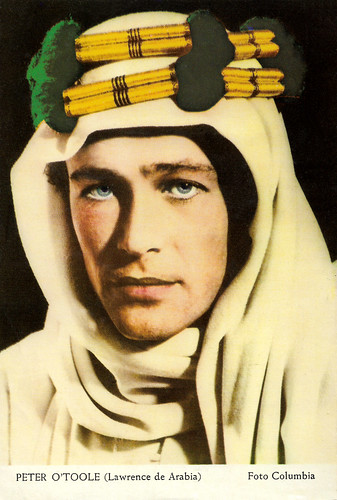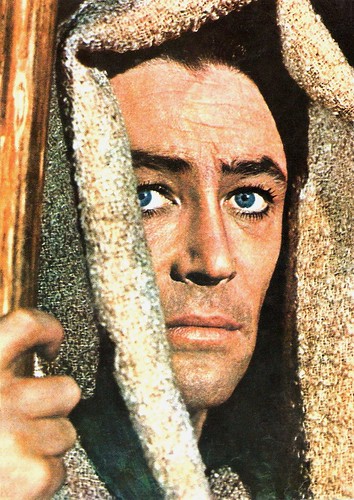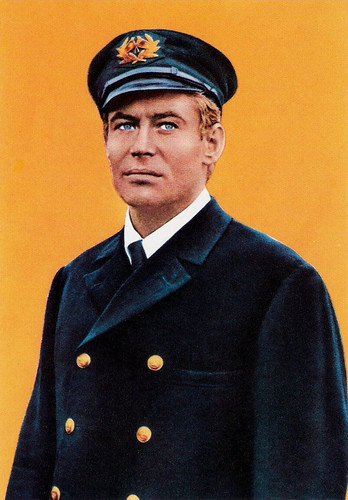
Dutch card. Photo: Columbia. Peter O'Toole in Lawrence of Arabia (David Lean, 1962).

West German postcard by Kolibri, Minden/Westf, no. 2630. Photo: 20th Century Fox. Peter O'Toole in How to Steal a Million (William Wyler, 1966).

Romanian postcard by Casa Filmului Acin. Peter O'Toole in The Bible: In The Beginning... (John Huston, 1966).
Intensity and zeal
Peter Seamus Lorcan O'Toole was born in 1932. According to IMDb, he was born in Connemara, Ireland. Other sources indicate Leeds, England, where he also grew up, as his birthplace. In his autobiography 'Loitering with Intent: the Child' (1992), O’Toole wrote that he was not certain of his birthplace, while he had birth certificates from two countries.
However, he was the son of Constance Jane (née Ferguson), a Scottish nurse, and Patrick Joseph O'Toole, an Irish metal platter, football player and racecourse bookmaker. As a boy, Peter decided to become a journalist, beginning as a newspaper copyboy. Although he succeeded in becoming a reporter, he discovered the theatre and made his stage debut at 17. He served as a radioman in the Royal Navy for two years.
From 1952 to 1954 he attended the Royal Academy of Dramatic Art as a scholarship student. His classmates included Albert Finney, Alan Bates and Richard Harris. While at RADA he was active in protesting the British involvement in the Korean War. Later in the 1960s, he would be an active opponent of the Vietnam War. O'Toole began working in the theatre, gaining recognition as a Shakespearean actor at the Bristol Old Vic and with the English Stage Company, before making an inconspicuous film debut in the Walt Disney production Kidnapped (Robert Stevenson, 1960), a faithful adaptation of the Robert Louis Stevenson classic.
Two years later, O'Toole was chosen by director David Lean to play Thomas E. Lawrence in Lawrence of Arabia (David Lean, 1962). The part of the conflicted British liaison officer caught at the centre of an Arab revolt made O'Toole an international superstar. Brian McFarlane observes in the Encyclopaedia of British Film: “It was a remarkable study in obsession, catching the right balance between mystic and man of action, bringing to the role kinds of intensity and zeal that few other British actors could have done”.
Peter O'Toole continued successfully in artistically rich films as well as less artistic but commercially rewarding projects. He was nominated as Best Actor for King Henry II in Becket (Peter Glenville, 1964) starring Richard Burton. Two years later he was nominated again for portraying Henry II, this time in The Lion in Winter (Anthony Harvey, 1968) alongside Katharine Hepburn.

Spanish postcard by Postal Oscarcolor, no. 279. Photo: Publicity shot for Becket (Peter Glenville, 1964) with Richard Burton.

Italian postcard by Rotalfoto, Milano (Milan), no. 278. Peter O'Toole in Lord Jim (Richard Brooks, 1965).

Spanish postcard by Postal Oscarcolor, no. 583.
One of Hollywood's most infamous party animals
Peter O‘Toole was one of the greatest actors of his generation. During his career, he received eight Academy Award nominations but never won the Oscar. TCM suggests that his flamboyant personal life was maybe to blame: “Known as one of Hollywood's most infamous party animals in his prime, O'Toole earned a reputation as a prodigious drinker alongside his contemporaries and fellow countrymen Richard Harris, Richard Burton, and Oliver Reed.
O'Toole's booze-fueled hijinks eventually took their toll, however, on both his career and his health. While the actor did manage to pick up his fifth Oscar nomination for the wickedly funny The Ruling Class (Peter Medak, 1972), the seventies were a low point in the actor's personal life and career.”
Once considered one of the most beautiful men ever to grace the silver screen only a decade earlier, O'Toole's alcoholism had cost him his looks. In 1979, his 20-year marriage to Irish actress Siân Phillips ended in divorce, when she left him for a younger man. Medical problems threatened to destroy his life. Originally he thought the problems were the result of his drinking but it turned out to be stomach cancer. He survived by giving up alcohol and by serious medical treatment.
He returned to the cinema with two triumphant performances: a sadistic, tyrannical director in the behind-the-scenes comedy The Stunt Man (Richard Rush, 1980), and an ageing swashbuckling film star strongly resembling Errol Flynn in My Favorite Year (Richard Benjamin, 1982). For both films, he received an Oscar nomination. On stage, he received good reviews as John Tanner in Man and Superman and as Henry Higgins in Pygmalion (1984), and he won a Laurence Olivier Award for his performance in Jeffrey Bernard is Unwell (1989).
However, O'Toole found meaningful film roles increasingly difficult to come by. He appeared in such duds as Supergirl (Jeannot Swarc, 1984), Creator (Ivan Passer, 1985) and Club Paradise (Harold Ramis, 1986), but fortunately, he also appeared in the much-garlanded grand epic The Last Emperor (Bernardo Bertolucci, 1987). The film about the final Emperor of China (John Lone) won the Oscar for Best Picture.

Romanian postcard by Casa Filmului Acin, no 384.

Romanian postcard by Casa Filmului Acin, no. 593.

Spanish postcard by Postal Oscarcolor, no. 494.
Still in the game
After another series of lesser films, Peter O'Toole made again a comeback in the new decennium. In 1999 he won an Emmy Award for his role in the mini-series Joan of Arc (Christian Duguay, 1999). In 2003, he received a Special Oscar for lifetime achievement, an honour O'Toole only reluctantly accepted. He wrote the Academy a letter stating that he was “still in the game” and proved to be so in the following years.
In the blockbuster Troy (Wolfgang Petersen, 2004) he played the dying King Priam opposite Brad Pitt. In the BBC drama serial Casanova (2005), he appeared as the older version of the legendary 18th-century Italian adventurer. He was once again nominated for the Best Actor Academy Award for his portrayal of Maurice in the May-December romantic comedy Venus (Roger Michell, 2006), scripted by Hanif Kureishi. It was his eighth nomination.
O'Toole co-starred as the voice of food critic Anton Ego in the Pixar box office hit Ratatouille (Brad Bird, Jan Pinkava, 2007), an animated film about a rat with dreams of becoming the greatest chef in Paris. O'Toole appeared in the second season of Showtime's hit drama series The Tudors (2008), portraying Pope Paul III, who excommunicates King Henry VIII (Jonathan Rhys Meyers) from the church. This act leads to a showdown between the two men in seven of the ten episodes.
Peter O'Toole narrated the horror comedy Eldorado (Richard Driscoll, 2011), but in 2012, O'Toole released a statement that he was retiring from acting. Following a long illness, Peter O'Toole died peacefully in a London hospital in 2013.
He had two daughters, actresses Patricia O'Toole and Kate O'Toole (1960), from his marriage to Siân Phillips. He also has a son, actor Lorcan O'Toole (1983), by American model Karen Brown. For his body of work, he has won four Golden Globes, a BAFTA, and an Emmy.

French postcard by Travelling Editions, no. CP 65. Peter O'Toole in The Bible: In The Beginning... (John Huston, 1966).

German autograph card by Kino.

Dutch collectors card. Peter O'Toole in The Last Emperor (Bernardo Bertolucci, 1987).
Sources: Brian McFarlane (Encyclopaedia of British Film), Nathan Southern (AllMovie), Jim Beaver (IMDb), TCM, Robert Pardi (Filmreference.com), Wikipedia and IMDb.
3 comments:
Wonderful post Bob. I'll never forget O'Toole in The Stunt Man, a strangely engaging film that he put on his back and carried. Highly recommended.
Thanks Bunchie. O' Toole is despite all these Oscar nominations still underrated. He's a giant.
Good night sweet prince. You will be missed.
Post a Comment